Anywasy I Made This Meme To Represent What Just Happened Rn

anywasy i made this meme to represent what just happened rn
More Posts from One-braincell-in-use and Others
Just an experiment. Reblog if you actually give a fuck about male victims of domestic violence and rape.
Of fucking course
What sick bastard doesn’t


so can we start hunting down white liberals now or what
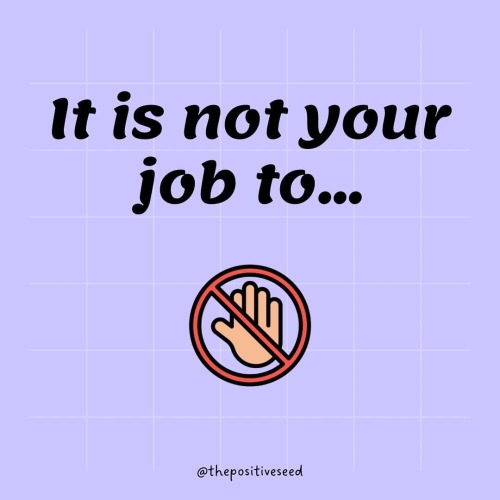





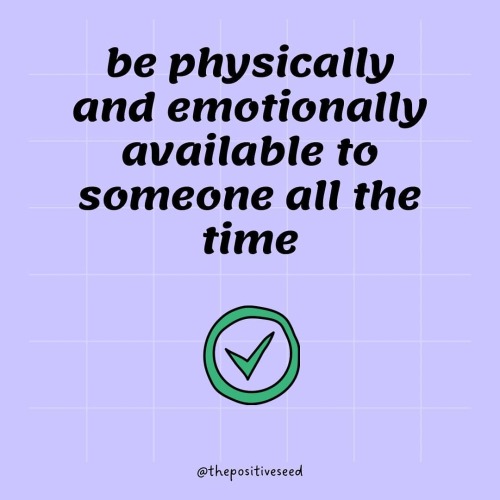
@positiveseed
YOUTUBE

Writing Notes: Flat & Round Characters

Flat Characters - Consist of only a few features (usually based on clichés). They’re generally static characters meant to serve the story.
Round Characters - Have depth. They have weaknesses, strengths, flaws, fears, tastes, and dreams. They are well characterized in order to seem real. They're dynamic and change over time. They feel affected by the story’s events because they suffer their consequences and learn from them which makes them more realistic and believable.
The use of flat characters
Flat characters are often used in TV comedies (30-minute sitcoms with canned laughter) because comedic stories usually focus on the anecdote and the joke.
Thanks to their commonplace situations and characters, sitcoms are able to transmit a sense of familiarity to the spectator.
Flat characters also have a supporting role in stories with round main characters in order to achieve one of these effects:
Fast recognition: You need your readers/audience to easily recognize the type of characters you are presenting.
Contrast: Flat and/or static characters can highlight the internal or external evolution of round characters.
When to avoid flat characters
Unless you’re specifically looking for one of the previous effects listed for flat characters, it’s best that your characters (especially the protagonists) are round in order for your readers to identify with them.
Creating round and deep characters
Consider the following:
1. Internal Changes
Do your characters undergo any internal changes throughout the story?
Think about their situation at the beginning of the story.
Is it the same as it is at the end? It shouldn’t be.
They can be worse or better, but the story’s events should have affected them in some way.
2. External Changes
Do the external circumstances surrounding your characters change throughout the story?
Just as their personalities suffer variations, their external conditions should as well.
For example, one of your characters could be a farmer at the beginning of the story and then become a warrior by the end.
3. Goals
What do your characters want?
They should have a conscious desire – something that moves them into action.
4. Wishes
What do your characters need?
Regardless of what they think they want, there’s something they need at an unconscious level – something different from what they consciously desire.
That contradiction will bring depth to your fictional heroes.
5. Achievements
What do your characters attain?
Do they achieve any of their goals?
How does that affect them?
If you have the answer to the last question, you’ll have a clearer idea of how the story’s events have changed their way of facing life.
For instance, if they achieve what they wanted at the beginning of the tale but that’s not what they really need, they can learn from their mistakes and try to correct them.
However, they might also give into frustration.
6. Weaknesses
What are their weaknesses?
Everybody makes mistakes and has fears and flaws, so if you want your characters to be more believable, they’d better have weak points and see themselves in need of facing them if possible.
Your characters overcoming these weaknesses or not depends on the story you want to tell and on the type of evolution you want them to experience.
Some overcome them and progress while others don’t and fail. The contrast between them is what makes the story more believable.
7. Strengths
What are their strengths?
Apart from weaknesses, your characters can have strong points they may or may not know about.
Sometimes, they discover them and learn how to make the most of them.
Other times, they do not know, and it leads them to failure.
You, as a writer, should be clear about those strengths and so should your readers be in order to better understand your characters.
8. Conflicts
What’s your characters’ inner conflicts?
Once you’ve answered the previous seven areas of question, you’ll find this one easier to answer.
Every good character must deal with an inner conflict throughout the story such as a mental debate between what they need and what they want or a moral struggle between what they’re trying to attain and what they consider correct.
This type of dilemma makes your characters interesting, and their experiences can turn into life lessons for your readers.
Source Writing References: Worldbuilding ⚜ Plot ⚜ Character ⚜ "Well-Rounded Character" Worksheet ⚜ On Conflict
🚨 We Need Your Kindness to Survive 🚨
Hello, My name is Mosab Elderawi, and I live in Gaza with my family. Life here has become harder than I ever imagined, and I’m writing this with hope in my heart that you might hear our story.
The ongoing war has devastated my family. We’ve lost 25 family members—each one a beloved part of our lives, taken too soon. I miss them deeply—their laughter, their presence, their love. Every day is a reminder of this unimaginable loss.

64.media.tumblr.com

64.media.tumblr.com

64.media.tumblr.com

64.media.tumblr.com

64.media.tumblr.com
We are now facing daily challenges to survive—things that most people take for granted, like food, clean water, and a safe place to sleep. The harsh realities of life here have replaced our dreams with the constant fight for survival.
Our Current Situation:
💔 Lost Stability: The war has left us without work or a stable source of income. 🍞 Basic Needs: Food and water are becoming harder to afford with rising prices and scarce resources. 📚 Dreams on Hold: Like so many here, my family’s dreams have been replaced by the need to simply survive. 😢 Unimaginable Loss: Losing 25 loved ones has left a void that can never be filled.
How You Can Help:
I’m sharing our story with the hope that someone out there might care. Even $5 can make a big difference for us, and if you’re unable to donate, just reblogging this post can help spread the word.
Your kindness, no matter how small, is something we’ll never forget.
What This Means to Us:
Your support is not about changing our entire situation—it’s about giving us a little relief, a little hope, and a way to keep going. We are not asking for much, and we understand if you can’t donate. Sharing our story is just as valuable to us as a donation.
Thank you for reading this far. It means the world to us to know that someone is listening. Your kindness gives us strength and helps us believe in a better tomorrow.
With all our gratitude, Mosab Elderawi and Family ❤️
✅️ Vetted by ✅️
@gazavetters, my number verified on the list is ( #309 )✅️

@fancysmudges @brokenbackmountain @just-browsing1222-deactivated20 @mothblossoms @aleciosun @fluoresensitive @khizuo @lesbiandardevil @transmutationisms @schoolhater @timogsilangan @appsa @buttercuparry @sayruq @malcriada @palestinegenocide @sar-soor @akajustmerry @annoyingloudmicrowavecultist @feluka @tortiefrancis @flower-tea-fairies @tsaricides @riding-with-the-wild-hunt @visenyasdragon @belleandsaintsebastian @ear-motif @kordeliiius @brutaliakhoa @raelyn-dreams @troythecatfish @theropoda @tamarrud @4ft10tvlandfangirl @queerstudiesnatural @northgazaupdates2 @skatezophrenic @awetistic-things @camgirlpanopticon @baby-girl-aaron-dessner @nabulsi @sygol @junglejim4322 @heritageposts @chososhairbuns @palistani @dlxxv-vetted-donations @illuminated-runas @imjustheretotrytohelp
MERRY CHRISTMAS, SUCKERS! JESUS LOVES ALL OF YOU!


Writing Tips
Punctuating Dialogue
✧
➸ “This is a sentence.”
➸ “This is a sentence with a dialogue tag at the end,” she said.
➸ “This,” he said, “is a sentence split by a dialogue tag.”
➸ “This is a sentence,” she said. “This is a new sentence. New sentences are capitalized.”
➸ “This is a sentence followed by an action.” He stood. “They are separate sentences because he did not speak by standing.”
➸ She said, “Use a comma to introduce dialogue. The quote is capitalized when the dialogue tag is at the beginning.”
➸ “Use a comma when a dialogue tag follows a quote,” he said.
“Unless there is a question mark?” she asked.
“Or an exclamation point!” he answered. “The dialogue tag still remains uncapitalized because it’s not truly the end of the sentence.”
➸ “Periods and commas should be inside closing quotations.”
➸ “Hey!” she shouted, “Sometimes exclamation points are inside quotations.”
However, if it’s not dialogue exclamation points can also be “outside”!
➸ “Does this apply to question marks too?” he asked.
If it’s not dialogue, can question marks be “outside”? (Yes, they can.)
➸ “This applies to dashes too. Inside quotations dashes typically express—“
“Interruption” — but there are situations dashes may be outside.
➸ “You’ll notice that exclamation marks, question marks, and dashes do not have a comma after them. Ellipses don’t have a comma after them either…” she said.
➸ “My teacher said, ‘Use single quotation marks when quoting within dialogue.’”
➸ “Use paragraph breaks to indicate a new speaker,” he said.
“The readers will know it’s someone else speaking.”
➸ “If it’s the same speaker but different paragraph, keep the closing quotation off.
“This shows it’s the same character continuing to speak.”
When I say "king behavior" I usually mean something Jesus would do
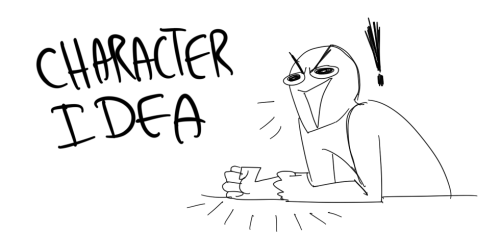
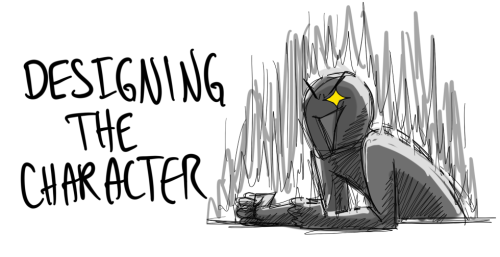
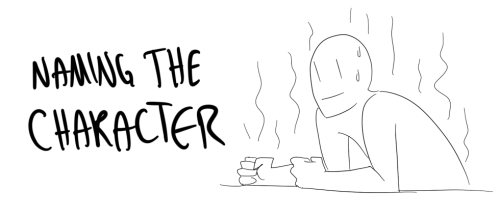
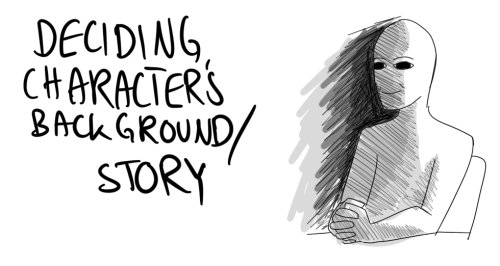
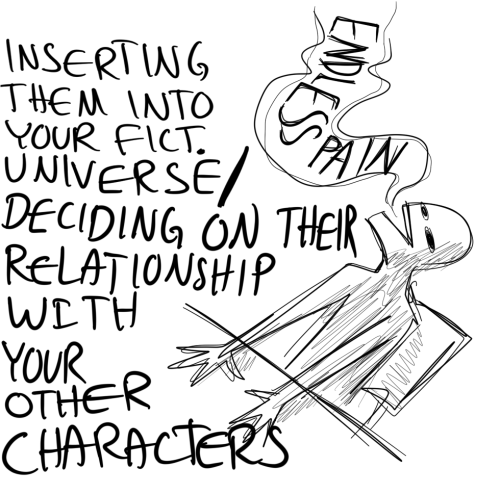
the suffering never ends
-
 cestlaviemily liked this · 2 weeks ago
cestlaviemily liked this · 2 weeks ago -
 deathbywaterstuff liked this · 2 weeks ago
deathbywaterstuff liked this · 2 weeks ago -
 what-if-a-black-dog reblogged this · 2 weeks ago
what-if-a-black-dog reblogged this · 2 weeks ago -
 what-if-a-black-dog liked this · 2 weeks ago
what-if-a-black-dog liked this · 2 weeks ago -
 wouldbeheroine liked this · 3 weeks ago
wouldbeheroine liked this · 3 weeks ago -
 ominouspositivity-or-else reblogged this · 3 weeks ago
ominouspositivity-or-else reblogged this · 3 weeks ago -
 musingsofacatholic liked this · 3 weeks ago
musingsofacatholic liked this · 3 weeks ago -
 californiagoddess liked this · 3 weeks ago
californiagoddess liked this · 3 weeks ago -
 hellokittymachine liked this · 3 weeks ago
hellokittymachine liked this · 3 weeks ago -
 disorientation reblogged this · 3 weeks ago
disorientation reblogged this · 3 weeks ago -
 disorientation liked this · 3 weeks ago
disorientation liked this · 3 weeks ago -
 benzohoarder reblogged this · 3 weeks ago
benzohoarder reblogged this · 3 weeks ago -
 chuki7861 liked this · 3 weeks ago
chuki7861 liked this · 3 weeks ago -
 amenistaa liked this · 3 weeks ago
amenistaa liked this · 3 weeks ago -
 flyingwiththesun liked this · 3 weeks ago
flyingwiththesun liked this · 3 weeks ago -
 lynalovebug313 liked this · 3 weeks ago
lynalovebug313 liked this · 3 weeks ago -
 user-85720 liked this · 3 weeks ago
user-85720 liked this · 3 weeks ago -
 trolagygirl2022 liked this · 3 weeks ago
trolagygirl2022 liked this · 3 weeks ago -
 iswearthisisrepetitive liked this · 3 weeks ago
iswearthisisrepetitive liked this · 3 weeks ago -
 floral-cutie liked this · 3 weeks ago
floral-cutie liked this · 3 weeks ago -
 improbablyoutofdata reblogged this · 3 weeks ago
improbablyoutofdata reblogged this · 3 weeks ago -
 improbablyoutofdata liked this · 3 weeks ago
improbablyoutofdata liked this · 3 weeks ago -
 55nine liked this · 3 weeks ago
55nine liked this · 3 weeks ago -
 lolomustdie liked this · 3 weeks ago
lolomustdie liked this · 3 weeks ago -
 rottensha liked this · 3 weeks ago
rottensha liked this · 3 weeks ago -
 singingshutin liked this · 3 weeks ago
singingshutin liked this · 3 weeks ago -
 crawlerr liked this · 3 weeks ago
crawlerr liked this · 3 weeks ago -
 spiritofsaintaugustine reblogged this · 3 weeks ago
spiritofsaintaugustine reblogged this · 3 weeks ago -
 wasting-away-in-vienna liked this · 3 weeks ago
wasting-away-in-vienna liked this · 3 weeks ago -
 avianasroad liked this · 3 weeks ago
avianasroad liked this · 3 weeks ago -
 cryptmoth liked this · 3 weeks ago
cryptmoth liked this · 3 weeks ago -
 angelineve liked this · 3 weeks ago
angelineve liked this · 3 weeks ago -
 celestialbruise liked this · 3 weeks ago
celestialbruise liked this · 3 weeks ago -
 greaterguts liked this · 3 weeks ago
greaterguts liked this · 3 weeks ago -
 udbudsnusjusub liked this · 4 weeks ago
udbudsnusjusub liked this · 4 weeks ago -
 appleciderbutch liked this · 4 weeks ago
appleciderbutch liked this · 4 weeks ago -
 algunasfloresdespertaron liked this · 4 weeks ago
algunasfloresdespertaron liked this · 4 weeks ago -
 luminary-tragedian liked this · 4 weeks ago
luminary-tragedian liked this · 4 weeks ago -
 thesunkeptrising reblogged this · 4 weeks ago
thesunkeptrising reblogged this · 4 weeks ago -
 plague-main liked this · 4 weeks ago
plague-main liked this · 4 weeks ago -
 ohholydyke reblogged this · 4 weeks ago
ohholydyke reblogged this · 4 weeks ago -
 nortism liked this · 4 weeks ago
nortism liked this · 4 weeks ago -
 proseandpsalms reblogged this · 4 weeks ago
proseandpsalms reblogged this · 4 weeks ago -
 vukunrah liked this · 4 weeks ago
vukunrah liked this · 4 weeks ago -
 inbetweenletters reblogged this · 4 weeks ago
inbetweenletters reblogged this · 4 weeks ago -
 olympiaorchid reblogged this · 4 weeks ago
olympiaorchid reblogged this · 4 weeks ago

I go by he/him, call me Micah! Minor, student, and professional procrastinator.
55 posts